语法专项课件(情态动词can和could的用法).
- 格式:ppt
- 大小:324.00 KB
- 文档页数:4
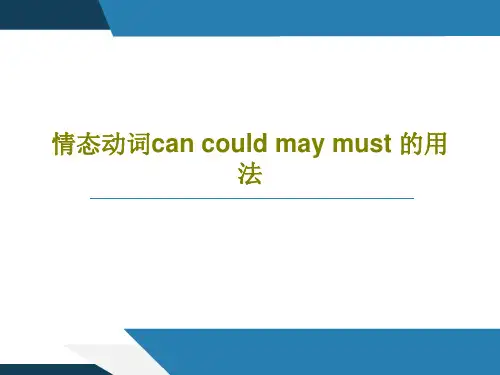
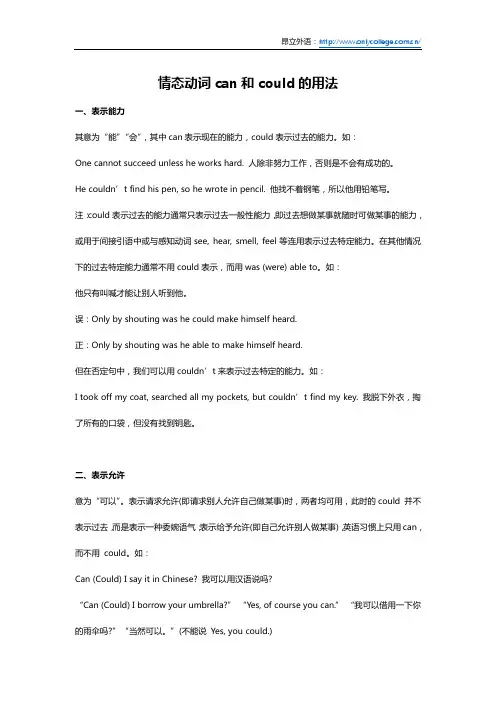
情态动词can和could的用法一、表示能力其意为“能”“会”,其中can表示现在的能力,could表示过去的能力。
如:One cannot succeed unless he works hard. 人除非努力工作,否则是不会有成功的。
He couldn’t find his pen, so he wrote in pencil. 他找不着钢笔,所以他用铅笔写。
注:could表示过去的能力通常只表示过去一般性能力,即过去想做某事就随时可做某事的能力,或用于间接引语中或与感知动词see, hear, smell, feel等连用表示过去特定能力。
在其他情况下的过去特定能力通常不用could表示,而用was (were) able to。
如:他只有叫喊才能让别人听到他。
误:Only by shouting was he could make himself heard.正:Only by shouting was he able to make himself heard.但在否定句中,我们可以用couldn’t来表示过去特定的能力。
如:I took off my coat, searched all my pockets, but couldn’t find my key. 我脱下外衣,掏了所有的口袋,但没有找到钥匙。
二、表示允许意为“可以”。
表示请求允许(即请求别人允许自己做某事)时,两者均可用,此时的could 并不表示过去,而是表示一种委婉语气;表示给予允许(即自己允许别人做某事),英语习惯上只用can,而不用could。
如:Can (Could) I say it in Chinese? 我可以用汉语说吗?“Can (Could) I borrow your umbrella?” “Yes, of course you can.” “我可以借用一下你的雨伞吗?”“当然可以。
”(不能说Yes, you could.)注:以上说的是针对现在或将来情况而言的,若谈的是过去情况,则过去could只用于表示过去一般性允许(即表示某人随时都可以做某事),而不表示特定的允许(即表示在过去某一特定情况下允许进行某一特定的活动),遇此情况需换成其他表达。
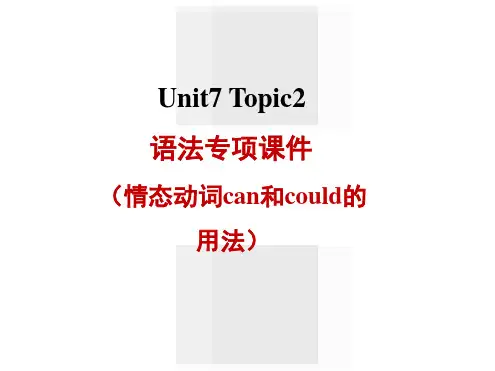

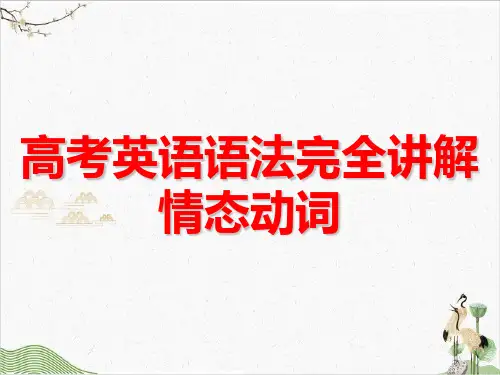
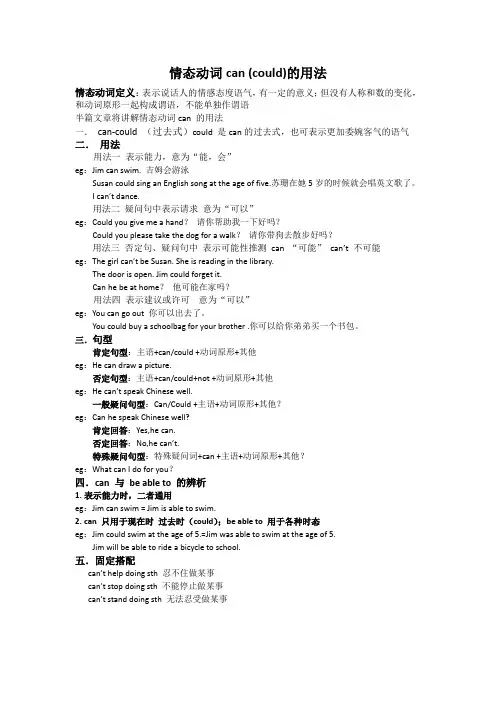
情态动词can (could)的用法情态动词定义:表示说话人的情感态度语气,有一定的意义;但没有人称和数的变化,和动词原形一起构成谓语,不能单独作谓语半篇文章将讲解情态动词can 的用法一.can-could (过去式)could 是can的过去式,也可表示更加委婉客气的语气二.用法用法一表示能力,意为“能,会”eg:Jim can swim. 吉姆会游泳Susan could sing an English song at the age of five.苏珊在她5岁的时候就会唱英文歌了。
I can’t dance.用法二疑问句中表示请求意为“可以”eg:Could you give me a hand?请你帮助我一下好吗?Could you please take the dog for a walk?请你带狗去散步好吗?用法三否定句、疑问句中表示可能性推测can “可能”can’t 不可能eg:The girl can’t be Susan. She is reading in the library.The door is open. Jim could forget it.Can he be at home?他可能在家吗?用法四表示建议或许可意为“可以”eg:You can go out 你可以出去了。
You could buy a schoolbag for your brother .你可以给你弟弟买一个书包。
三.句型肯定句型:主语+can/could +动词原形+其他eg:He can draw a picture.否定句型:主语+can/could+not +动词原形+其他eg:He can’t speak Chinese well.一般疑问句型:Can/Could +主语+动词原形+其他?eg:Can he speak Chinese well?肯定回答:Yes,he can.否定回答:No,he can’t.特殊疑问句型:特殊疑问词+can +主语+动词原形+其他?eg:What can I do for you?四.can 与be able to 的辨析1.表示能力时,二者通用eg:Jim can swim = Jim is able to swim.2.can 只用于现在时过去时(could);be able to 用于各种时态eg:Jim could swim at the age of 5.=Jim was able to swim at the age of 5.Jim will be able to ride a bicycle to school.五.固定搭配can’t help doing sth 忍不住做某事can’t stop doing sth 不能停止做某事can’t stand doing sth 无法忍受做某事六.could 表示更加委婉客气的请求1.委婉请求别人做某事(提出请求)句型:Could you (please) do sth? /Could you please not do sth?肯定回答:Yes,I can. /Sure./Certainly./Of course I can,/No problem.否定回答:Sorry,I can’t+原因/I’m afraid I can’t+原因eg:Could you please take the bag to the living room?Yes,sure.2.委婉请求别人允许自己做某事(征求许可)句型:Could I do sth?肯定回答:Yes,you can./Yes, please.否定回答:No,you can’t/I’m afraid you can’teg:Could I play with my best friend?I’m afraid you can’t.You have too much homework to do.。

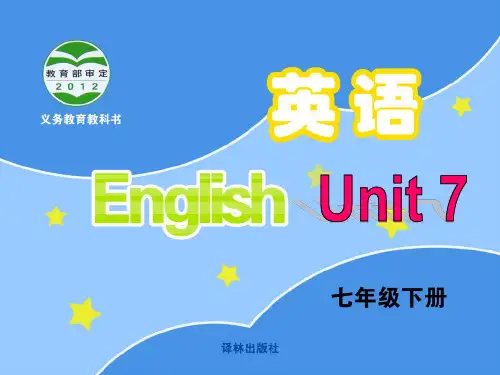
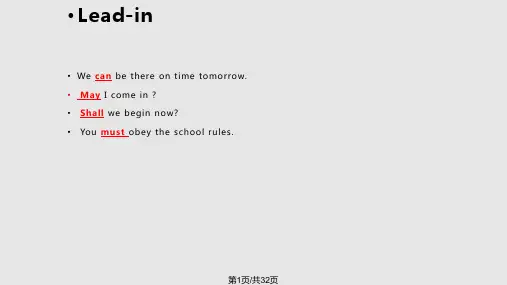
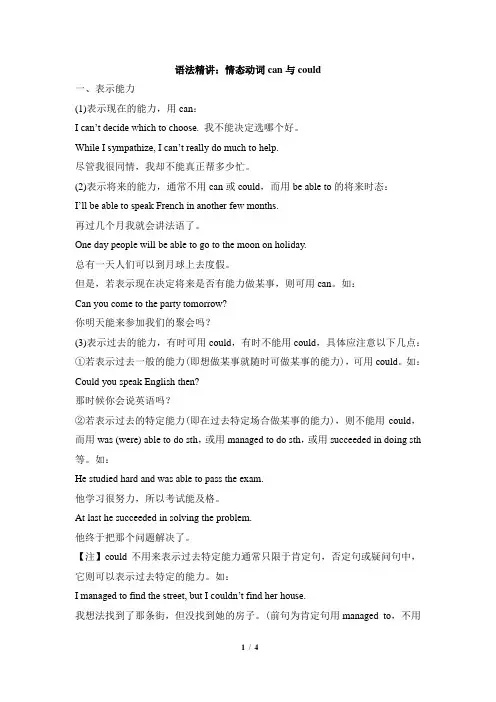
语法精讲:情态动词can与could一、表示能力(1)表示现在的能力,用can:I can’t decide which to choose. 我不能决定选哪个好。
While I sympathize, I can’t really do much to help.尽管我很同情,我却不能真正帮多少忙。
(2)表示将来的能力,通常不用can或could,而用be able to的将来时态:I’ll be able to speak French in another few months.再过几个月我就会讲法语了。
One day people will be able to go to the moon on holiday.总有一天人们可以到月球上去度假。
但是,若表示现在决定将来是否有能力做某事,则可用can。
如:Can you come to the party tomorrow?你明天能来参加我们的聚会吗?(3)表示过去的能力,有时可用could,有时不能用could,具体应注意以下几点:①若表示过去一般的能力(即想做某事就随时可做某事的能力),可用could。
如:Could you speak English then?那时候你会说英语吗?②若表示过去的特定能力(即在过去特定场合做某事的能力),则不能用could,而用was (were) able to do sth,或用managed to do sth,或用succeeded in doing sth 等。
如:He studied hard and was able to pass the exam.他学习很努力,所以考试能及格。
At last he succeeded in solving the problem.他终于把那个问题解决了。
【注】could不用来表示过去特定能力通常只限于肯定句,否定句或疑问句中,它则可以表示过去特定的能力。

(一)can和could的用法1.表示能力或客观可能性,还可以表示请求和允许。
如:Can you finish this work tonight?你今晚能完成这项工作吗?Can you finish the work in such a short time你能在那么短的时间内完成这项工作吗?Man can not live without air.人离了空气不能活。
What can you do?你能干点什么呢?Can you pass me the books?你能给我递一下书吗?Could you help me,please?请问,你能帮助我吗?— Can I go now? — Yes,you can.—我现在可以走了吗?—你可以。
注意:①could也可表示请求,语气委婉,主要用于疑问句,不可用于肯定句,答语应用can(即could不能用于现在时态的简略答语中)。
如:Could I come to see you tomorrow?我明天能来看您吗?Yes,you can. (否定答语可用No,I'm afraid not.)是的,你可以。
(不,恐怕不行。
)②can表示能力时,还可用be able to代替。
如:I'll not be able to come this afternoon.我今下午不能来。
can 和could 只能用于现在式和过去式两种时态,将来时态用be able to 来表示。
He could help us at all.他完全可以帮助我们。
With the teacher's help,I shall be able to speak English correctly.由于老师的帮助,我将能准确地讲英语。
2. “can”表达推测例:Can the news be true? 这消息会是真的吗?The news can't be true. 这消息不会是真的吧。
could用法看到这幅图片,你能想到什么呢?请用简单的语言来描写一下。
会使用can,could表建议和推测(10-15分钟)一、情态动词can的基本用法情态动词can有一定的词义,但不能独立存在,它必须与动词原形一起构成谓语。
情态动词can没有人称和数的变化。
其具体用法如下:1.表示"能、会",指脑力或体力方面的"能力"。
例如:I can speak English.我会讲英语。
Jim can swim but I can't.吉姆会游泳,但我不会。
2.表示"可能",常用于否定句或疑问句中,指某种可能性。
例如:Han Mei can't be in the classroom.韩梅不可能在教室里。
Can he come here today, please?请问他今天能到这里来吗?3.表示"可以",常用于口语中,指许可或请求做某事。
例如:Can I have a cup of tea, please?请问我可以喝一杯茶吗?You can go out.你可以出去了?二、情态动词的注意事项1. can的口诀:情态动词can、can、can,动词原形跟后面。
变疑问can提前,变否定not后面加上去。
主语人称单复数,情态动词不能变。
2. 情态动词can可以引导肯定句和疑问句。
(1)、肯定句:主语 + can + 动词原形 + 其他成分(2)、疑问句:can + 主语 + 动词原形 + 其他成分3.can 引导的肯定句变为疑问句的方法:(一调二改三问号)(1)、can 提前,首字母大写。
(一调)(2)、肯定句中主语在变成疑问句时的变化。
(二改)如:肯定句:You can feed the animals.你可以喂动物。
疑问句:Can I feed the animals?我能喂动物吗?(3)、在句尾后面加问号。
看到这幅图片,你能想到什么呢?请用简单的语言来描写一下。
会使用can,could 表建议和推测(10-15分钟)一、情态动词can 的基本用法情态动词can 有一定的词义,但不能独立存在,它必须与动词原形一起构成谓语。
情态动词could 用法can没有人称和数的变化。
其具体用法如下:1.表示"能、会",指脑力或体力方面的"能力"。
例如:I can speak English.我会讲英语。
Jim can swim but I can't.吉姆会游泳,但我不会。
2.表示"可能",常用于否定句或疑问句中,指某种可能性。
例如:Han Mei can't be in the classroom.韩梅不可能在教室里。
3.表示"可以",常用于口语中,指许可或请求做某事。
例如:Can I have a cup of tea, please?请问我可以喝一杯茶吗?You can go out.你可以出去了?二、情态动词的注意事项1. can的口诀:情态动词can、can、can,动词原形跟后面。
变疑问can提前,变否定not后面加上去。
主语人称单复数,情态动词不能变。
2. 情态动词can可以引导肯定句和疑问句。
(1)、肯定句:主语 + can + 动词原形 + 其他成分(2)、疑问句:can + 主语 + 动词原形 + 其他成分3.can 引导的肯定句变为疑问句的方法:(一调二改三问号)(1)、can 提前,首字母大写。
(一调)(2)、肯定句中主语在变成疑问句时的变化。
(二改)如:肯定句:You can feed the animals.你可以喂动物。
疑问句:Can I feed the animals?我能喂动物吗?(3)、在句尾后面加问号。
(三问号)4. Can的一般疑问句回答:(1)、肯定回答:Yes,主语(必须人称代词) + can.(2)、否定回答:No,主语(必须人称代词) + can not (can’t)/mustn’t. Yes 或 no 后要使用逗号,除了I 以外,其他人称都要小写。